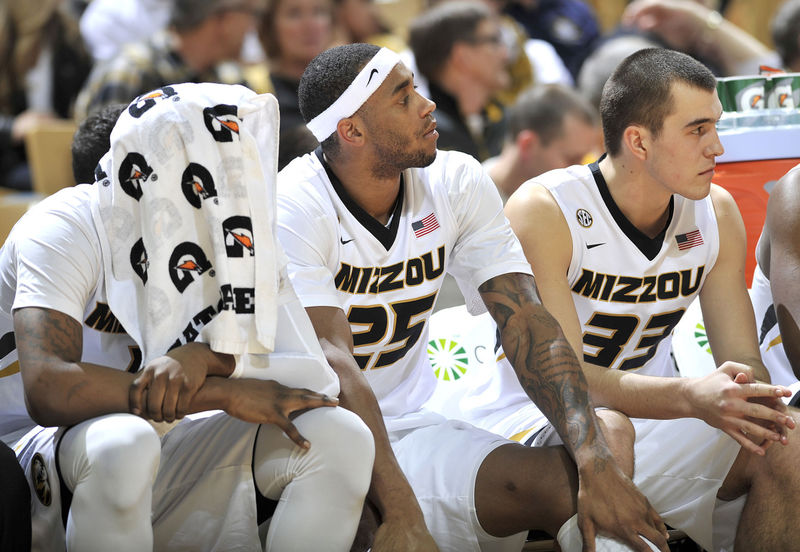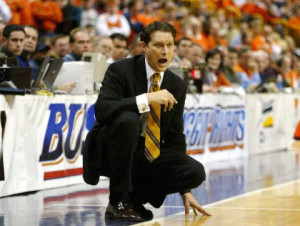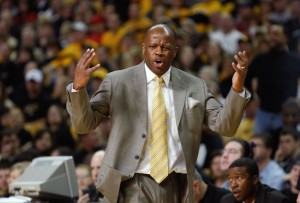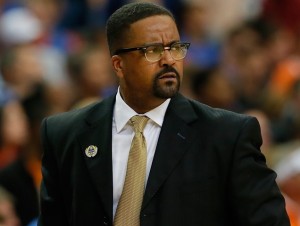The Missouri Tigers were finally able to manage a victory in SEC play this past Saturday as they defeated Tennessee 75-64. The win snapped a 9 game losing streak and gave the Tigers a second conference win which equals the amount of conference wins that the team had a year ago. Despite the victory, questions still remain with regards to the future of the program under head coach Kim Anderson who has struggled mightily trying to get things turned around.
So how, exactly, did we arrive at this point? After all, Missouri is only four years removed from a Big 12 Tournament championship and a 2-seed in the NCAA Tournament. Perhaps an unfortunate chain of events that began more than 15 years ago can put things in perspective.
The Quin Snyder Years
After legendary and iconic coach Norm Stewart “retired” after the 1999 season, it was clear that many high-rollers wanted to see the basketball program go in a new direction. Athletic Director Mike Alden, likely crumbled under the pressure of some of Missouri’s largest donors and hired a young, hot-shot Duke assistant named Quin Snyder. It is quite popular for Missouri fans to completely admonish this decision 16 years later, but Snyder was a hot prospect at the time and was going to get a chance to cut his coaching teeth at a large program somewhere.
Things looked promising out of the gate as Snyder’s first two teams made it appear that Mizzou was a program on the rise as Missouri made the NCAA Tournament in both 2000 and 2001. Snyder was also recruiting at a high-level which injected even more excitement into the program. Kareem Rush was a huge star at this point and Snynder was bringing in players like Rickey Paulding, Arthur Johnson, and Travon Bryant. The 2002 caught fire in the NCAA Tournament and made it all the way to the regional final before falling to Oklahoma.
Things began to go south during the 2003 season as problems began to arise with a JUCO transfer point guard named Ricky Clemons eventually led the program to embarrassment and probation. Choking girlfriends, accusations of improper benefits, ATV accidents and jailhouse tapes would be the necessary bullets fired that would eventually lead to Snyder’s demise at Missouri. The program never really recovered and the team failed to make the NCAA’s in three consecutive seasons. Snyder was fired in the middle of the 2006 season and the program was left in dire straights.
Mike Anderson’s Rebuilt and Exit
It was clear that Mike Alden had his work cut out for him in hiring a new basketball coach after the way the Quin Snyder era ended. Alden was nearly fired himself for that fiasco, but survived to bring in Mike Anderson, a solid coach with a championship background as an assistant at Arkansas. After two years of mediocrity, Anderson led the 2009 team to a Big 12 Tournament title and a trip to the Elite 8. The program appeared to be on the upswing and Anderson had accomplished a tremendous rebuilding job.
After diminishing results and numerous flirtation attempts with other jobs, the shine on Anderson began to wear off. His 2011 team, which started off ranked in the top 20, completely
fell off the map and barely made the tournament as an 11-seed. It was clear something was amiss as Anderson’s recruiting had completely fallen off and had no players signed for the 2011/2012 season. In March of 2011 it was announced that Anderson would be leaving Missouri to take the Arkansas job. Many believe that Anderson knew he would be leaving well in advance which explains the plummeting team morale and lack of recruiting efforts. He left a core group of senior players in Kim English, Marcus Denmon, Steve Moore, Jarrett Sutton, Laurence Bowers (or so we thought), and Ricardo Ratliffe that vowed to “reconcile it by winning.”
Who the Hell is Frank Haith?
I can’t count how many text messages I received on the day of April 4th, 2011 that said something to this extent. Haith was hired seemingly out of nowhere and few people (media included) even knew who this man was. It was certainly not the ideal way to begin a coaching tenure, and months after Haith was hired, he was named in the yahoo sports Miami article that alleged several improprieties within the landscape of the University of Miami athletics department. Haith would survive the initial allegations although the pending findings would loom over his head from the beginning. It didn’t help that Mizzou had already suffered a very public rejection from Purdue coach Matt Painter, a coach that Mike Alden thought he had all but landed at one point in time.
Haith was able to take a senior-laden team to a school-record 30 regular season wins and a Big 12 Tournament title. Although the team was inexplicably upset in the first round of the NCAA Tournament by Norfolk State, it appeared that the program was once again heading in the right direction and Frank Haith was named AP Coach of the Year.
With large roster turnover pending, Haith was able to patch the program together with a slew of transfers. Jabari Brown, Ernest Ross and Keion Bell were brought in to try to keep the team from completely tanking. The transfer situation worked initially as Missouri appeared to be a top-10 caliber team through the non-conference season but lost several close games down the stretch in route to a 9-seed in the NCAA’s. A blowout loss to Colorado State followed and many Missouri fans began to question Haith’s ability to build the program over the long haul.
Fan concern grew even more over the next year as another transfer-laden team failed to meet expectations and missed the NCAA Tournament completely. Attendance slipped to an all-time Mizzou Arena low as the 2013/2014 season saw an average of only 9,000 fans per game. Supposedly Haith was looking for a contract extension after the 2014 season and Mike Alden was not so hot on the idea. Haith decided to get ahead of the pending storm and ran with arms flailing to Tulsa, leaving the Missouri head coaching job open yet again.
Kim Anderson Comes Home
Year 1: After a somewhat lengthy, yet very quiet coaching search, former assistant coach and player Kim Anderson was finally hired on April 28th of 2014. Anderson was just coming off of a Division II National Championship at UCM, yet it was a hire that reeked of desperation by many that follow the program. It was also was met with unabashed praise by other fans that valued the past history of Missouri basketball. Anderson was seemingly passed over for the job the three previous times, but it was clear that bringing someone in with an attachment to the program was a direction that had not yet been taken since Norm Stewart’s “retirement.”
Anderson was able to keep key recruits Namon Wright and Jakeenan Gant in place, and signed some decent talent himself in Montaque Gill-Ceasar, Tremaine Isabell and DeAngelo Allen, but dealt with a rash of hindering situations such as player exits and arrests that left his roster extremely young and unseasoned. The doubters fears were quickly realized as Anderson lost his first game as head coach to UMKC at home. It would only go downhill from there and the team is now in the midst of an 11-game conference losing streak with very few positives to point to for future hope. The 2014/2015 season has been an utter disaster in every way imaginable and has included several player suspensions and even a too-close-for-comfort plane ride for the coach. It is obvious, however, that Anderson deserves at least two more seasons to try to right the ship and to bring the program back from oblivion once again.
Year 2: Even the most positive fan would have trouble viewing even a minute amount of progress from year one to year two under coach Anderson. The Tigers still sit all alone in last place in the SEC at 9-16 (2-10) and small crowds continue to saunter into Mizzou Arena likely to witness another beat-down. Many will say that Kim Anderson’s job should be safe for another season at least, but what has Anderson does thus far to prove he deserves another chance to right the ship at Mizzou? It is very likely that Missouri will not win even 20 games during Anderson’s first two seasons as head coach. Anderson has won only ONE game away from Mizzou arena during his tenure and that was a victory over Division II Chaminade a season ago.
So perhaps it is time for Mizzou to press the reset button once again on a basketball program that has been dripping with instability and uncertainty for the better part of 18 years now. Athletic Director Mack Rhoades will have an impact decision to make in the next few weeks as the Tigers will play their last game on March 5th (NCAA sanctions prohibit the team from playing in the SEC or any post-season tournaments).





